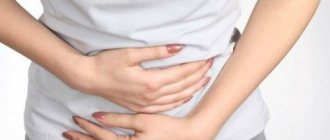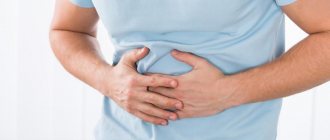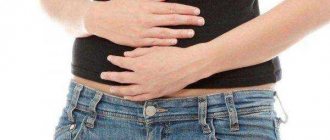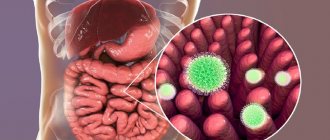Why does your stomach swell before your period?
The cycle reflects the complex hormonal processes occurring in a woman’s body. Throughout the reproductive period, monthly changes in the level of sex steroids are observed, the main of which gynecologists call:
If estrogen levels peak around ovulation, a significant amount of progesterone is produced on the eve of menstruation. PMS is a consequence of decreased estrogen production while increasing progesterone.
The abdomen swells during menstrual periods due to the following hormonal factors:
- Endometrial proliferation. Estrogens promote the growth of the endometrium. Sufficient thickness of the inner layer of the uterus is a necessary condition for implantation of the fertilized egg in the event of fertilization of a female egg by a male sperm. A swollen uterus affects the intestines, causing visual enlargement in the abdominal area. After detachment of the functional layer of the endometrium, the size of the uterine body returns to its original values.
- Swelling. Under the influence of sex hormones, fluid accumulates in the tissues of the body. This mechanism prevents blood loss during menstruation.
- Ovulation. The release of the egg from the follicle is accompanied by a hormonal surge. Increased gas formation and flatulence before menstruation are caused by the active production of progesterone. This hormone has a relaxing effect on the digestive tract.
Experts name the following reasons for bloating before menstruation:
- Features of intestinal motility. A few days before your period, blood flow to the ovaries and uterus increases. The intestinal walls are subject to compression, which causes spasms. The movement of food is uneven. This is why it often swells during menstruation. Digestive and stool disturbances may occur.
- Pregnancy. If your stomach swells before your period, you may have conceived. Progesterone causes changes in the female body for pregnancy and subsequent birth of a child.
- Binge eating. A big belly during menstruation may be the result of overeating. Increased appetite is a side effect of progesterone, which causes hunger. Typically, women experience cravings for salty and sweet foods that retain fluid in the body. Gas during menstruation occurs due to poor digestion of large amounts of food.
Sometimes the stomach is inflated as a result of pathological conditions:
- Diseases of the digestive tract. Exacerbation of colitis or gastroduodenitis is often observed during menstruation due to the accumulation of water and blood in the abdominal cavity. The gases produced lead to flatulence, cramps, nausea and constipation. Pain may occur in the lower abdomen.
- Diseases of the genitourinary system. Fluid is retained in tissues during pathological conditions of the kidneys. After the onset of menstruation, the number of urinations decreases. In women, the stomach swells, swelling appears, and blood pressure rises.
- Gynecological pathologies. Inflammatory processes and benign tumors are characterized by acute pain that can radiate to the anus and sacrum. The abdomen is inflated with adhesive disease, adnexitis, formations of the uterus and ovaries.
Pathological problems with abdominal enlargement
Any woman should always closely monitor any changes and behavior of the body. For some, these may be ordinary symptoms of PMS, but if this has not been observed before, it is recommended to undergo an examination by a gynecologist.
Common problems:
- Inflammation of the genitourinary system.
- Disruption of the gastrointestinal tract.
- Tumors in the pelvic organs.
You especially need to be wary if, in addition to an enlarged abdomen, other accompanying symptoms appear: nausea, vomiting, fever, frequent urination, pain in the lower part of the peritoneum, intense discharge during menstruation.
His body “talks” to every person and reports problems. You just need to listen to him. An enlarged abdomen is one such sign.
If there are no periods or pregnancy, but the symptom does not go away, then this indicates a pathological process.
The main problem is that internal factors are not visible to the normal eye. One can only make assumptions.
A specialist can determine the exact reason why bloating occurs during menstruation. A woman notices only external changes. This is an enlarged belly and extra pounds.
How many days before menstruation does bloating appear?
Abdominal enlargement before menstruation is individual. The belly swells 2-3 days before menstruation. Some women notice bloating 1.5-2 weeks before the onset of their period. Sometimes the belly increases during menstruation, which depends on the following factors:
- body features;
- physical fitness (pumped up or weak abs);
- elasticity of the muscles of the uterus, which weakens after childbirth.
In young girls who play sports, the belly does not increase before menstruation. An increase of 2 kg in weight is observed in women who have given birth and overweight women. As a rule, on the 3rd day of the cycle, waist size and weight return to normal.
Preventive measures against constipation and bloating
Constipation, discomfort and bloating can be prevented by: a few days before and during your period:
- eat buckwheat, oatmeal, stewed vegetables, stale white bread, lean meat, soups, yoghurts, kefir, and also drink clean water;
- give up fast food, soda, milk, plenty of sweet, salty, canned food, cabbage, cucumbers, tomatoes;
- do not fry food, but stew or boil it, avoiding spicy seasonings;
- eat 4-5 meals a day, little by little;
- do exercises that promote proper bowel function (pulling the knees of bent legs to the chest from a lying position, lowering them to the sides in the same starting position);
- take prebiotics and probiotics selected by your doctor, drink tea with the addition of chamomile, lemon balm, and mint.
We recommend reading about why the ovaries bother you during menstruation. From the article you will learn about how the ovaries work and why they can hurt in different phases of the menstrual cycle.
And here is more information about why the ovaries can hurt.
Every girl needs to know that periods can be inconvenient, but they shouldn’t be a pain. If flatulence and pain literally interfere with your life, and a correct lifestyle does not help get rid of the problem, you should definitely see a doctor. And from the appearance of a small tummy, bloating before menstruation, which soon disappear, you should not panic.
What to do about bloating during menstruation
When the stomach is inflated, you can use medications and traditional medicine.
Medicines for bloating during menstruation
Depending on the cause of the increase in waist size and flatulence, the following medications can be used:
- antispasmodics (Spazmalgon, No-shpu, Drotaverine) for uterine and intestinal spasms;
- carminatives (Espumizan) for increased gas formation;
- enterosorbents (Smecta), if the abdominal cavity is inflated due to flatulence and stool disturbances are present.
Folk remedies for bloating before menstruation
In the absence of pathologies from the digestive system during menstruation, it is useful to add to the diet:
- parsley decoction;
- dill water;
- water infusion of cumin;
- crushed carrot seeds (cumin, dill);
- potato juice;
- Mint tea.
Diet for flatulence before menstruation
If the abdominal cavity inflates during menstruation, you must adhere to the rules of a healthy diet:
- It is recommended to reduce the portion size and increase the number of meals.
- It is advisable to limit or exclude from the diet foods that cause flatulence.
- You need to consume less sugar and salt, which retain fluid in the body and create additional stress on the heart.
- It is better to replace coffee and strong tea, which contribute to flatulence, with plain water.
- For concomitant pain syndrome, herbal teas and fruit drinks made from cranberries and lingonberries are useful.
When can there be bloating before menstruation?
Changes in a woman’s well-being during the menstrual cycle directly correlate with her hormonal levels. Each ovulation for the body is a chance to conceive a child, which must be used by creating the most favorable conditions for fertilization of the egg.
Hormones perform this function in a woman’s body. Mainly progesterone. Its production occurs during ovulation and the subsequent period of the cycle - the luteal phase. Therefore, bloating begins to bother you in the second half of the cycle: from the day of ovulation to menstruation. A few hours after the start of menstruation, progesterone in the blood decreases sharply, and bloating disappears.
Premenstrual syndrome
Premenstrual syndrome is a set of clinical manifestations that the vast majority of women experience 2-10 days before the onset of menstruation. In addition to irritability and swelling, symptoms include bloating.
Bloating is associated with two reasons, which will be discussed in detail below:
- eating disorders;
- the influence of hormones actively produced by the female body during the period of ovulation.
A slight increase in the abdomen before menstruation and a weight gain of up to 2-3 kilograms is normal. But if the belly becomes rounded, as if in mid-pregnancy, and the weight gain exceeds 3 kilograms, you need to consult a doctor.
Hormonal reasons
Menstruation is a consequence of the proper functioning of the reproductive system. In order to understand why the belly swells before menstruation, it is necessary to consider which hormones increase in concentration before menstruation, and how this affects the female body.
The “culprits” of all changes in a woman’s condition before menstruation are three hormones:
Progesterone has the most striking effect, catalyzing the disruption of water-salt metabolism. That is, the concentration of sodium in the body increases, and fluid begins to be retained in fat cells. Considering the fact that a large number of these cells are located in the abdominal area, it is the enlargement of the abdomen that is noticeable.
Swelling in the second half of the cycle is not a disruption in the functioning of a woman’s body, but a protection thought out by nature from the consequences of menstrual bleeding. But if the swelling is very pronounced, there is a reason to visit a doctor and check the functioning of the kidneys (chronic renal failure) and the thyroid gland (myxedema).
In addition to swelling, there is another reason why the stomach swells before menstruation. Progesterone acts on the uterus, promoting thickening of its endothelium due to the flow of blood and fluid into its walls. This is necessary so that the fertilized egg can implant in the uterus and develop according to the plan for a normal pregnancy.
An enlarged uterus not only adds volume to the abdomen, but also puts pressure on the intestines, causing gas formation.
Pregnancy and bloating
In the first weeks of pregnancy, the stomach may also swell, as before menstruation. The reason can again be cited as the effect of progesterone on the size of the uterus.
You can distinguish bloating during menstruation from bloating with successful fertilization using the main sign: the belly that was swollen during pregnancy is hard on palpation.
Poor nutrition
Poor nutrition is the main cause of abdominal discomfort. But most women who do not suffer from gastrointestinal disease experience bloating only in the last week of the menstrual cycle.
The reason for this phenomenon may lie in the effect of hormones on a woman’s nervous system. When experiencing irritability, aggression, or, conversely, depression, the body tries to restore emotional comfort by eating large amounts of tasty food.
Why is this happening? There are several explanations for this:
- Irritability is the result of increased activity of the sympathetic division of the autonomic system, and to correct this, it is necessary to increase the activity of the parasympathetic division. The easiest way to do this is by eating; it is with this mechanism that almost all food addictions are closely related.
- Eating for most people is closely related to the area of pleasure. Trying to compensate for a bad mood, women find the fastest and easiest way to solve the problem by going to the refrigerator.
- Before menstruation, due to hormonal imbalance and associated emotional instability, a woman’s will decreases. And if at normal times she can calmly walk past a pastry shop, then during this period it is difficult for her to refuse temptation.
Preventing bloating during menstruation
If your stomach swells during menstruation, it is recommended:
- engage in sports permitted during menstrual periods (gymnastics, yoga);
- Healthy food;
- use warm, soothing baths with essential oils or sea salt before the onset of menstruation;
- maintain the necessary rhythm of intimate life;
- do not wear tight clothes and underwear that impair blood supply to the pelvis.
Causes of abdominal discomfort during KD
A woman's body constantly experiences hormonal changes that depend on the menstrual cycle. However, the cause of severe bloating during menstruation may be hidden in poor nutrition, as well as in some diseases of the abdominal cavity.
Hormones
During ovulation, a change in hormonal levels occurs.
Menstruation, which regularly occurs in a woman, indicates the passage of a cycle of readiness for conception. A mature egg is released from the ovary, ovulation occurs, and during this period the production of progesterone changes greatly.
The hormone affects the smooth muscles of the body, resulting in short-term disruptions in the intestines. This causes such unpleasant sensations as constipation or diarrhea, flatulence and a feeling of severe bloating. But without high levels of progesterone, a fertilized egg would not be able to implant itself in the loose structure of the uterus.
Increased fluid accumulation
The cause of this condition can be heart disease, kidney disease, as well as abuse of salty foods. But sometimes water retention is caused by prolactin, estrogen and vasopressin. These hormones reduce the frequency of urination, which is why unresolved water is forced to be deposited along with fatty tissues.
Pregnancy
Increased progesterone levels during pregnancy lead to bloating
Some women experience menstruation even with pregnancy, which is also due to hormonal characteristics. When pregnancy occurs, progesterone and other hormones are again produced, which lead to bloating.
During gestation itself, rapid bloating may be a consequence of uterine hypertonicity. This is an active muscle contraction caused by a spasm, which can lead to miscarriage. Accompanied by severe twitching, pain and heaviness, bleeding and frequent urination often occur.
Diseases
The cause of bloating during menstruation may be tumors in the pelvis
When an unpleasant symptom appears, a woman may experience the following pathologies:
- inflammatory processes in the genitourinary system - always accompanied by pain, changes in the nature of discharge, and a feeling of heaviness;
- tumors in the pelvic organs - may occur without symptoms;
- intestinal diseases - digestive disorders often occur, including during the period between menstruation;
- endometriosis is a change in the mucous layer of the uterus, which is characterized by heavy periods with heavy discharge.
Nausea, fever and vomiting should be a reason to immediately consult a doctor.
It is impossible to determine the cause of bloating at home. Often it is not accompanied by additional symptoms, so women do not pay any attention to the unpleasant sensation.
Nutrition
Constant overeating, eating sweet, salty, and fast food can cause discomfort during menstruation. If the rest of the time the hamburger has no effect on digestion, then during the KD period due to hormonal changes it can even cause vomiting.
Causes of bloating
The most common cause of bloating before menstruation is hormonal changes. The menstrual cycle is a continuous series of hormonal changes. The essence of the reproductive period is to release a sufficient amount of progesterone, the sex hormone responsible for preparing the female body for pregnancy. Progesterone affects the smooth muscles of the uterus, it swells and increases slightly in size, preparing to receive an egg. So, the stomach may increase slightly in volume. The more developed a woman's abdominal muscles are, the less likely it is that bloating will be noticeable.
In addition, under the influence of the hormone progesterone, water is retained in the body, which is why the limbs and the pelvic area swell (this can also cause a feeling of bloating).
An equally common cause of bloating and increased gas formation is uncontrolled appetite, characteristic of premenstrual syndrome. By consuming huge amounts of salty, smoked, and especially sweet foods, the stomach can become very bloated, accompanying this process with gases.
Possible reasons also include:
- gastrointestinal diseases;
- if there is bloating and a delay in menstruation, it is possible that the cause of the bloating was pregnancy;
- pathological processes and tumors of the female reproductive system.
Bloating during and before menstruation may be accompanied by a feeling of distension of the peritoneum, rumbling and flatulence.
SERGEY RYKOV: “Frequent and unpleasant emissions of gases due to parasites. Get rid of it the proven way - write down the recipe. » Read more >>
All of the above symptoms are not evidence of pathology; as soon as menstruation begins, they will stop.
If bloating persists and does not depend on physiological changes, a woman should consult a doctor to find out the real reason why the bloating has not gone away naturally and begin treatment in a timely manner.
What if I'm pregnant?
If your period has not arrived and your stomach is swollen, then you should take a pregnancy test or donate blood for hCG.
If pregnancy is confirmed, but discomfort remains, then it is worth visiting a gynecologist to rule out pathologies, including ectopic pregnancy or miscarriage. During a normal pregnancy, a woman should not be bothered by pain.
In addition to bloating, pregnancy is accompanied by other symptoms:
- breast swelling;
- loss of strength;
- spasms and pain;
- dizziness.
It is worth noting that menstruation does not always stop during pregnancy - brown spotting may appear.
The main difference between a belly swollen before menstruation and a belly swollen during pregnancy is that in the latter case, upon palpation, the belly feels hard to the touch.
This reason is quite real. Sometimes, the onset of pregnancy can be confused with PMS. During this period, the female body produces the hormone progesterone.
It prepares the reproductive organs for bearing a child. With the onset of pregnancy, changes occur within the woman.
The egg enters the uterus and attaches to the wall (endometrium). This process is otherwise called implantation. Progesterone affects the endometrium.
It expands, absorbs nutrients and loosens. In turn, this causes the innermost lining of the uterus to swell and the abdomen begins to enlarge.
Rules of conduct for reducing flatulence
To reduce unpleasant bloating during menstruation, you should adhere to the following principles:
- You need to completely reconsider your diet from the second half of the menstrual cycle. Food should be easily digestible, steamed or boiled.
- It is worth refraining from foods that provoke gas formation: beans, beans and lentils, cabbage, grapes, cucumbers and radishes, milk, kvass and lactic acid products.
- It is worth limiting your salt intake. You only need to add it to ready-made dishes (you can consume no more than 13–14 grams of salt per day, and when cooking it is easy to exceed this limit). You need to completely avoid salted, pickled, smoked foods, because they retain fluid in the body.
- Gas formation is enhanced by sweets (this is also the answer to the question why, in case of any gastrointestinal disease, the patient is first prohibited from cakes, pastries, chocolates and other chemical sweets flavored with huge amounts of sugar and vegetable fat), carbonated and alcoholic drinks: especially beer and wine, Accordingly, they also need to be removed from the diet.
- An adult needs to drink at least 2 liters of clean water per day.
- It is important to regularly, and especially the last 2 weeks of the cycle, consume minerals: zinc, calcium, magnesium, potassium, and vitamins A, C and B. To saturate your body with them, you need to eat enough spinach, broccoli, asparagus, nuts, buckwheat , chicken meat, hard cheese and eggs.
How you can help
Bloating during menstruation is the result of the endocrine system and poor nutrition. But directly influencing the hormonal balance of the body is difficult and even harmful, but it is quite possible to reduce the manifestation of symptoms with the help of nutrition.
First of all, it is necessary to exclude from the diet all foods that increase the risk of flatulence:
- beans;
- cabbage;
- fresh baked goods;
- alcohol;
- chocolate and coffee;
- carbonated drinks.
If the problem of gas formation in the second half of the menstrual cycle is relevant, it is important to reconsider your diet, giving up heavy heavy meals in favor of fractional meals and light meals.
Pills
Medicines that reduce bloating are chosen depending on what is causing the bloating. If during bloating the stomach not only swells, but also swells, you can use carminative drugs:
Antispasmodics, which relax the smooth muscles of both the uterus and intestines, are also highly effective:
But taking medications should not be uncontrolled: pregnancy can be a cause of bloating in the second half of the cycle, and taking many medications is prohibited while carrying a child.
If the problem of bloating is systemic, medications should be taken under the supervision of a physician.
Psychotherapy
The problem of bloating before menstruation is often associated with emotional discomfort and the desire to “eat” irritability with treats. This mechanism really works, because when eating food, the parasympathetic part of the autonomic nervous system is activated.
But taking into account the fact that eating a large amount of food can provoke gas, it is better to use other relaxation mechanisms. In particular, understanding the reason for her bad mood during PMS helps a woman experience this period more calmly.
Folk remedies
Drinks can help reduce bloating. Even ordinary strong tea can reduce the process of gas formation due to the tannic acid content. But traditional medicine recipes are more effective:
- Chamomile tea is a remedy that has both a carminative and a relaxing effect. Preparing this tea is very simple: for one glass of 200-250 ml you should take 1 tablespoon of dried chamomile flowers, pour boiling water and leave for 20 minutes under the lid. Drink as needed in the afternoon.
- If the enlargement of the abdomen occurs against the background of fluid retention, swelling, it is useful to drink tea from diuretic herbs: mint, lemon balm, lingonberry leaf. Such decoctions should be consumed in the first half of the day, without exceeding the permissible dose.
Despite the safety of these drugs, you should not take them constantly without the advice of a doctor.
Source
Medicines for swelling
To eliminate bloating and increased gas formation before menstruation, you can resort to the following medications:
- No-shpa, Drotaverin, Almagel are antispasmodic medications that will reduce pain during bloating;
- Activated carbon is a sorbent that removes toxins from the body (suitable when the stomach is bloated from overeating);
- Omeprazole, Festal, pancreatin are enzymatic agents that improve digestion;
- Dimethicone, Kuplaton - special agents that stimulate the removal of excess gases from the body;
- Espumisan is a popular remedy for combating excess gas formation.
Herbs for bloating
It happens that patients suffering from bloating do not want to see a doctor or take specialized medications. Traditional medicine will help you decide what to do in this case.
Decoctions of mint or chamomile will help if a woman gets very bloated before her period. The medicine is prepared as follows: add 250 ml of boiling water to a teaspoon of dried crushed herbs (if the decoction is based on mint and chamomile, add a spoonful of each herb to a glass of liquid), stir the decoction and infuse for half an hour. You can take the decoction with the addition of honey, like regular herbal tea.
Other reasons
It happens that the abdominal area can swell both before and during ovulation. In many ways, bloating during menstruation depends on the characteristics of the body of a particular woman.
For what reasons can this condition occur:
- due to the characteristics of intestinal motility;
- due to the appearance of swelling;
- during the period of ovulation;
- during pregnancy;
- with the formation of uterine fibroids.
When premenstrual syndrome is accompanied by a bloated belly, and diarrhea, constipation or flatulence occur, this may be due to personal characteristics of intestinal motility. Sometimes the condition is due to the fact that before menstruation, a woman’s appetite sharply increases, her usual diet changes, and the digestive system cannot cope with the load.
For some, the intestines, like the uterus, relax under the influence of progesterone.
A bloated belly can be caused by excessive fluid accumulation in the body. In this case, the limbs are also susceptible to swelling, to the point that the fingers become very swollen. There is no need to be afraid of this. Before menstruation, the body usually accumulates water in the cells and intercellular space, which will leave it along with menstruation, and new water will be produced instead. In addition, if the bleeding is not replaced with fluid, this is fraught with serious consequences for the body.
Water retention is caused by increased levels of hormones: estrogen, progesterone and prolactin. They provoke the accumulation of sodium, which inhibits the removal of water from tissues. And the hormone vasopressin slows down the flow of urine.
It is because of the accumulation of fluid that some women experience regular weight gain during their menstrual periods. You shouldn’t pay special attention to this, since when the water comes out, the extra pounds go away.
To avoid the accumulation of large amounts of water and promote its renewal in the body, there is no need to limit drinking. On the contrary, it is better to regularly supply the body with fresh water so that it does not feel lack of it.
Bloating in the middle of the menstrual cycle is most likely associated with the ovulation process. Sometimes you feel so-called ovulatory pain, which is unpleasant but tolerable. Their cause is a rupture in the wall of the follicle from which the egg is released (this is ovulation). It may cause a slight pulling effect.
If a woman experiences bloating and does not have her period, this may indicate that she is pregnant.
And if there is also swelling in other parts of the body, especially the mammary glands, then it’s time to go to the pharmacy for a test. Some tests can show results as early as 8 days after expected conception. However, the test is not able to detect, for example, an ectopic pregnancy. To do this, you must undergo an ultrasound.
If, along with other symptoms in the lower abdomen, women planning to replenish their family experience pain, nagging pain, they are advised to hurry to the gynecologist. Such manifestations occur when spontaneous miscarriage is possible.
In addition to natural causes, the stomach may swell before menstruation due to the appearance of tumors. Often this turns out to be uterine fibroids. The fact that bloating during menstruation is caused by pathological processes is indicated by accompanying symptoms: pain, nausea, fever, persistent swelling, vomiting. If they appear, you should consult a doctor.
Possible causes of a bloated belly before menstruation
Before you begin to fight such manifestations of PMS, you should study the causes of flatulence in women. Menstruation is a very complex process, from a physiological point of view. It is accompanied by a serious hormonal surge. Therefore, any discomfort is worth attention and if you have any doubts, you should consult a doctor.
How many days before menstruation does bloating occur? This question also cannot be answered unambiguously. But there are a number of obvious reasons for the occurrence of flatulence before and during menstruation, by removing which a woman can significantly alleviate her condition:
Hormonal surges
During and before menstruation, progesterone, a hormone responsible for the successful fertilization of the egg and the subsequent development of the embryo, begins to be pumped into the body of every woman. Progesterone ensures relaxation of the uterine walls. But at the time of compaction of its inner layer, it can also lead to bloating and, as a result, discomfort in the tummy area. If fertilization does not occur, the amount of the hormone decreases and the belly, which increased a couple of days ago, returns to normal.
Pregnancy
It happens that during the few days when menstruation begins, a woman does not observe bleeding, but feels that her stomach is swollen, hurts, and there is a feeling of bloating and nausea. Heaviness and swelling appear in the chest, it swells.
If the belly is swollen, there is no period, and the delay is too long, you need to take a pregnancy test.
Even if the result turns out to be negative and the symptoms do not go away, you should definitely visit a gynecologist. If you have nagging pain in the lower abdomen, you should not hesitate to visit a specialist. Such symptoms can be the cause of many disorders (ectopic pregnancy, tumor).
Intestinal peristalsis
Bloating during menstruation and before the onset of menstruation can also be caused by active preparation of the body, including the pelvic organs. During this period, slight disturbances in the functioning of the digestive tract are often observed, which can cause intestinal swelling and excessive gas formation.
Swelling
The appearance of flatulence before menstruation can cause swelling of the body. Fingers, feet, hands swell. The eyelids and entire face may swell. The amount of fluid increases due to rising hormone levels. This may make your stomach appear swollen. Fluid removal is delayed, increasing body weight. But after the end of menstrual bleeding, the weight returns to normal, the swelling subsides on its own.
Ovulation
This is the process during which a woman has the highest chance of becoming pregnant. It is not surprising that at such a moment the body is at the peak of hormone production. Bloating can also be a sign of such changes.
If such a symptom is common and does not cause pain, there is no reason to worry. You just need to wait a couple of days. Otherwise (if pain or cramps appear), you should consult a doctor, since ovulation, although minor, is still an injury.
Neoplasms
Sometimes, the formation of gases can be a sign of the presence of any pathologies. If, in addition to flatulence, additional uncharacteristic symptoms are observed, such as nausea, vomiting, fever, swelling, cramps, pain, you should immediately consult a doctor and do a blood test. And also, do not neglect preventive examinations by a gynecologist every six months.
Bloating during menstruation: 7 ways to cope with the unpleasant sensation
Many women experience bloating before or during their period.
Can certain lifestyle changes help cope with this unpleasant feeling? Bloating during menstruation not only causes discomfort, but also spoils your mood. At such moments, there is a feeling of heaviness in the stomach, and sometimes it even seems that you have gained excess weight. Fortunately, some lifestyle changes can reduce these symptoms. What is bloating during menstruation? Period bloating is a condition in which a woman's belly becomes heavier and inflated before or during her period. Bloating is also considered one of several symptoms of premenstrual syndrome (PMS), which can occur 1-2 weeks before the start of your period. In addition to bloating, PMS symptoms include:
- Mood swings
- Fatigue
- Colic
- Acne
- Food cravings
- Breast swelling
- Headache
- Swelling
According to the American College of Obstetricians and Gynecologists, up to 85 percent of women experience PMS symptoms. What causes bloating?
Bloating before and during menstruation can be the result of changes in levels of the sex hormones progesterone and estrogen.
About a week before the start of menstruation, women's levels of the hormone progesterone drop. A decrease in progesterone levels causes the uterus to become free of endometrium, which causes menstrual bleeding. Research shows that changes in progesterone and estrogen levels not only cause menstrual bleeding, but also cause the body to retain more water and salt. Body cells fill with water, causing bloating. A 2011 study found that it is on the first day of menstruation that a woman's body accumulates the most water and causes the most bloating. How to relieve bloating? There are ways to reduce water retention, which in turn will help relieve period bloating symptoms:
Avoid salty foods Salt increases the amount of water a person stores. Avoiding salty foods will help solve this problem. The American Heart Association recommends that people limit their salt intake to 1,500 mg per day. Many processed foods contain salt, so cooking at home using only fresh ingredients is one way to avoid excess salt. Eat potassium-rich foods Research shows that potassium lowers sodium levels and increases urine production. Thus, potassium helps reduce water retention and control bloating. Potassium-rich foods to eat to avoid bloating include:
- Dark leafy greens, such as spinach
- Sweet potato
- Bananas
- Avocado
- Tomatoes
Try diuretics
Diuretic products increase urine production. This process helps the body remove excess water. Many foods have natural diuretic properties, for example:
- Asparagus
- Pineapples
- Peaches
- cucumbers
- Leek
- Ginger
- Garlic
Diuretics are also available in tablet form. A doctor may prescribe them if your periods are accompanied by unpleasant sensations and home treatments do not help.
Drink plenty of water There is information that water improves kidney function. It should be noted, however, that there is currently no scientific evidence to support this data, but it is still worth a try. Water, in any case, will improve your well-being.
Avoid Refined Carbohydrates Refined carbohydrates, such as white flour and processed sugars, cause blood sugar levels to spike. This increases insulin levels in the blood, which causes the kidneys to retain more salt. Elevated sodium levels lead to water retention, so we don't recommend consuming refined carbohydrates during your period.
Be active
A 2013 study found that regular exercise improved PMS symptoms. Since bloating is a symptom of PMS, regular exercise will help reduce it. To stay healthy, people should aim to do 2.5 hours of moderate exercise per week. Talk to your doctor about birth control pills A 2008 study suggests that birth control pills help relieve bloating during your period. However, some women reported the opposite effect. The effect of the pill can be different for each woman, so it's best to discuss your options with your doctor and try several different types of birth control to see which works best for PMS relief.
When should you see a doctor? For most women, bloating causes some discomfort, but does not interfere with their ability to carry out their daily duties. However, if bloating is affecting a woman's daily life, it is worth talking to her doctor. In addition, if bloating does not go away after the end of your period, you should also consult a doctor, as this may indicate a more serious illness. Bloating during menstruation: 7 ways to cope with the unpleasant feeling
How to get rid of bloated belly syndrome
As you can see, there are many reasons why your stomach bloats during menstruation. If you are sure that you are healthy and not pregnant, but you still feel bloated, there are several recommendations that can help cope with the situation:
- Follow the principles of proper nutrition. It has already been mentioned that bloating can be caused by simple overeating and poor quality foods. During and before menstruation, eliminate all harmful foods and eat less fatty foods.
- A few weeks before your period, you need to limit or completely eliminate salt, smoked foods, and spicy foods from your diet. Increased salt consumption causes fluid retention, and smoked and spicy foods can lead to irritation of the walls of the stomach and intestines, which also negatively affects the functioning of the gastrointestinal tract.
- Limit your consumption of raw vegetables and fruits that cause bloating (pears, cabbage, apricots, peaches, legumes).
- In order to avoid a situation where the stomach swells before menstruation, it is necessary to avoid the consumption of carbonated drinks. You should eat often, but in small portions. It is not recommended to drink food with food. Excess fluid dilutes gastric juices and can cause food to ferment. You should drink it 15–20 minutes before or 20–30 minutes after eating.
- To avoid bloating, you can start taking evening primrose oil (evening primrose seed oil). It effectively reduces symptoms of PMS and has a mild diuretic effect. It is also used to normalize the general condition upon the onset of menopause.
- Avoiding sugar and caffeine can also help relieve swelling and relieve excess gas. Once a month you can take vitamins E and B, magnesium, having previously discussed such a course with your doctor.
- Some women practice massaging their lower back, legs and thighs with a mixture of lavender, juniper and grape seed oils in a 3:3:5 ratio.
- Before your period begins, a bath with 3 drops of black pepper oil can help reduce bloating. During menstrual bleeding, baths should be avoided. Find out why you shouldn't take a bath during your period.
- Light physical activity increases the overall tone of the body and helps in the fight against gases. Running, gymnastics or regular morning exercises can help solve the problem.
Why does the stomach bloat and swell before, during and after menstruation?
Only one out of every five women does not notice bloating before menstruation as an uncomfortable symptom of PMS. Needless to say, a blurry waist pretty much spoils the mood.
Especially against the background of increased irritability associated with the same premenstrual syndrome. Some ladies hide the inflated “ball” under a corset or shapewear.
But it’s better to figure it out and change your lifestyle so that in any phase of the cycle a swollen belly and swelling do not cause inconvenience.
What causes bloating
In general, bloating is associated with excessive production of intestinal gases due to poor digestion. The process is often caused by the abuse of fatty and heavy foods, which are less processed by the gastrointestinal tract.
But women may have other reasons why their belly swells, especially if it happens a few days before their period. The symptom is caused by natural hormonal changes. In different phases of the cycle, the ratio of estrogen, progesterone and prolactin changes.
Each of the substances plays its role in ensuring female reproductive function.
These same hormonal substances cause the body's cells to accumulate and store fluid before bleeding. This explains why edema appears and the stomach swells before and during menstruation.
In parallel, the physiological process of preparation for conception takes place. The uterus enlarges, and so does the abdominal volume. Blood flows intensely to the pelvic area.
All this goes away after the end of menstruation due to the reverse mechanism against the background of non-pregnancy.
How many days before your period does your belly get bigger?
It is impossible to say for sure how many days bloating occurs before menstruation. Each body is individual; for some girls, the problem of bloating and swelling appears in another 1.5-2 weeks.
However, in most cases, the change is noticeable 3 days before the discharge. During this period, you can see a slight increase in body weight.
Those who pay attention to:
- sports, abdominal training;
- strengthening the pelvic floor muscles, which weaken with age and after childbirth;
- proper nutrition and prevention of excess weight.
Yes, obese women and women who have given birth experience an increase in the abdomen, but this reaction of the body is considered natural and normally disappears on the 2-3rd day of menstruation or after it.
Causes of bloating before menstruation
To combat the unpleasant symptoms of PMS, it is necessary to accurately determine the mechanism of their occurrence. Could bloating before menstruation be associated with pathologies? Yes, and you should definitely double-check this option. But there are other factors as well.
Hormonal reasons
A large belly on the eve of menstruation is associated with an increased concentration of progesterone; it is this hormone that is responsible for preparing the genital organs for conception. After ovulation, in the so-called luteal phase, the endometrium (the lining inside the uterus) grows.
It serves to nourish the embryo with all the necessary substances. The uterus swells and puts pressure on neighboring organs. When the body realizes that conception has not occurred, the endometrium exfoliates and comes out with blood during menstruation. The size of the abdomen returns to normal.
Intestinal peristalsis
The heavier uterus puts pressure on the intestines. Progesterone itself has an additional effect. It reduces the tone of the lower esophageal sphincter, gastric emptying takes longer, and food moves more slowly. Under the influence of the hormone, unpleasant intestinal symptoms before menstruation become more pronounced, pain in the abdomen, rumbling, lack of appetite, constipation or diarrhea may appear.
Pregnancy
When pregnancy cannot be ruled out and there is a delay, that is, the period has passed, but they are still missing, the first thing you should do is take a test. Two stripes appear on a special indicator after contact with urine if a specific hormone is detected - human chorionic gonadotropin (hCG).
But it is worth remembering that the result may be distorted due to pathological processes, for example, in the case of an ectopic pregnancy. To be completely sure, it is better to contact an antenatal clinic. An effective diagnostic method is pelvic ultrasound.
Pathological processes
Gynecological diseases - fibrosis, endometriosis, tumors of the uterus and ovaries - can be hidden behind a growing belly. In such cases, in addition to bloating before menstruation and swelling, the following are often present:
- failures in the regularity of the cycle;
- frequent urge to urinate;
- constant feeling of indigestion.
If your stomach is swollen and hurts, your body temperature is elevated, your bloody discharge is profuse or of an unusual color, additional symptoms appear and your health worsens, you should consult a gynecologist.
It happens that ailments similar to PMS are present, but menstruation does not begin. A check with a doctor will help rule out inflammatory processes and neoplasms in the genital organs.
Binge eating
Due to hormonal changes, many women feel hungry towards the end of their cycle. They are constantly drawn to eat, and the situation is aggravated by stress. But trying to cheer yourself up with nourishing and tasty food is not an option.
As mentioned above, before menstruation and the associated flatulence, food moves through the gastrointestinal tract more slowly, for this reason, heaviness in the stomach often appears after bloating, which is very inappropriate on the eve of menstruation.
It is advisable to ensure that the dishes are simple and do not burden the body.
Bloating during and immediately after menstruation
There is such severe flatulence during and after menstruation that the intestines do not return to normal and the stomach does not shrink. If necessary, use drugs that promote the removal of gases (Activated carbon, Meteospasmil, Espumisan). You can try folk remedies against bloating before menstruation - chamomile decoction, dill water.
It is important not to miss any pathology. You should consult a doctor if your stomach is still swollen after your period ends. Going to the hospital should not be delayed if you have the following symptoms:
- increased body temperature;
- unusual discharge;
- stomach ache.
Pregnancy can also be the cause of an enlarged waist after menstruation. This situation is likely if the discharge was more scarce than in previous cycles. You should check with a gynecologist if the bleeding has stopped, but the nagging pain in the abdomen and lower back continues.
Bloating before and during ovulation
Discomfort in the abdomen can appear not only during menstruation, but also on days 10-14 of the cycle - before and during ovulation. This is not associated with pathology. The process of follicle rupture occurs in all women who are able to conceive and give birth to a child. But not every one of them feels the symptoms of ovulation. Tingling in the back, nagging pain in the lower abdomen - women who have given birth feel especially acutely in the middle of the cycle.
To make sure that the malaise is associated specifically with ovulation, you can buy a special test at the pharmacy. It is noteworthy that in this situation it is easier to get an answer than to guess why the stomach swells before and during menstruation.
Gas formation as a sign of pregnancy
The cause of increased gas formation and bloating on the eve of menstruation may be pregnancy. The risk of flatulence is especially high if there is a predisposition and chronic diseases, such as irritable bowel syndrome.
Other digestive disorders may be present - nausea, lack of appetite, changes in taste, bitterness in the mouth. You should be wary and consult a gynecologist if your periods have not started within the prescribed period, and the following symptoms are observed:
- breasts are swollen;
- increased irritability;
- swelling of the arms and legs appeared;
- the stomach has increased in volume.
How to relieve bloating
A pre-adjusted diet is extremely important. Food portions should not be excessive. Even before your period, it is recommended to exclude foods that provoke increased gas formation in the stomach - cabbage, legumes, fresh bread, nuts, mushrooms, raw vegetables and fruits in excess. When digestion worsens, you can briefly add enzymes (Mezim, Festal).
But what to do if the abdominal cavity is still inflated during menstruation, severe discomfort and a feeling of fullness appear? Carminative medications (Espumizan, Kolikid, Pepfiz) are used as a therapeutic measure. They destroy gas bubbles, and they are absorbed by the intestinal walls.
If rumbling in the stomach accompanies all the time, and not just during menstruation, the reason may be a violation of the microflora. A course of probiotics (Linex, Hilak) will be useful.
It is recommended to take any medications only on the recommendation of a doctor. At the same time, it is worth trying to get rid of the problem in other ways.
Avoid salty foods
Excess salt causes the scale to show increased body weight.
It just so happens that 1 sodium molecule binds 20 water molecules. The more it enters the body, the greater the swelling and the higher the volume of retained fluid in the abdomen.
To prevent the belly from growing and bloating before and during menstruation, in the second half of the cycle you need to limit the consumption of salty foods (canned meat, sausages, marinades, smoked meats, fast food, sauces and seasonings). The reason is not only the risk of edema, but also the associated stress on the blood vessels and heart.
Eat potassium-rich foods
Why is potassium needed? It removes salt and, accordingly, prevents the appearance of edema. Foods that contain potassium include:
- pumpkin;
- boiled and baked potatoes;
- rice porrige;
- bananas;
- apples.
In addition to potassium, magnesium and B vitamins are needed. It is advisable to start taking a special vitamin complex 1-2 weeks before your period so that the body accumulates strength to fight stress and nervous tension.
Try diuretics
In some cases, diuretics - diuretic medications - are used a few days before menstruation. They help reduce edema, that is, the accumulation of fluid in the cells. But independent and uncontrolled use of such drugs is fraught with an imbalance of potassium and sodium, and excessive loss of salts.
There are natural remedies with a mild diuretic effect that will not cause such harm: zucchini, parsley, green tea, carrot and beet juice.
Drink plenty of water
It is important that a sufficient amount of fluid enters the body. Coffee, strong tea and soda are not suitable as they increase flatulence.
The preferred drink is water, especially a couple of days before and after your period starts. With its regular use, harmful substances are eliminated faster, digestion is normalized, constipation goes away, and the general condition of the body improves.
If tolerated, you can take chamomile decoction, cranberry and lingonberry fruit drinks. They relax the abdominal muscles and have a mild diuretic effect.
Avoid refined carbohydrates
Sweet foods also cause salt retention and increase the risk of developing edema on the eve of menstruation. This is because refined carbohydrates bind water. Not as strong as sodium, but still. 1 g of carbohydrates can retain up to 4 g of water.
Simple sugars are poorly satiating and contribute to the rotting of food masses. Therefore, if you are prone to flatulence, the menu is limited to:
- confectionery;
- bakery products;
- sweet sodas;
- store-bought juices;
- products containing sugar and white flour.
Be active
Physical activity is required in everyday life. Walking long distances is very beneficial. It has a positive effect on the gastrointestinal tract and improves the process of removing gases.
In the absence of contraindications, it is recommended to do abdominal exercises 2-3 times a week. Such training not only strengthens the abdominal muscles, but also the torso, and enriches the organs with oxygen and blood.
You can choose another sport - swimming, exercise equipment, dancing, aerobics, running. Avoid heavy exercise only during menstrual days and when you feel unwell. But after the end of menstruation they return to an active lifestyle.
Folk remedies for bloating during menstruation
In addition to general recommendations, there are many folk remedies that help with flatulence during menstruation. Here are the most popular ones:
- Black tea. Regular black tea can help relieve bloated belly syndrome. All thanks to the tannins it contains.
- Chamomile infusion. To prepare the decoction you will need 1 tablespoon of flowers per glass of boiling water. The resulting decoction is allowed to brew and taken at least 2 tablespoons before meals.
- Garlic powder. A product is prepared from dried and crushed garlic cloves. Taken twice a day after meals. It must be stored in a tightly closed glass container.
- Charcoal. If your stomach is swollen, it is better to use charcoal from linden or black poplar. In addition to flatulence, it helps with nausea. Take 2–4 teaspoons per day. This remedy is easy to prepare at home. Just wrap the branches in foil and put them in the oven for one hour. To check readiness, just press on the coal. The finished charcoal crumbles when pressed.
- Dill water. Well known for its properties. To prepare the decoction, you need to infuse 2 teaspoons of dill seeds in a glass of boiling water. The resulting tincture is taken one third of a glass three times a day before meals.
- Dandelion root. A decoction is prepared by infusing half a tablespoon of the herb in cold boiled water for 7–8 hours. You should take a quarter glass of the infusion before each meal.
- Wormwood. This decoction should be taken 3 tablespoons half an hour before meals. Prepare an infusion in the proportion of a tablespoon of herbs and a glass of boiling water. You can add a teaspoon of honey.
All these seeds and herbs can be freely purchased at the pharmacy. But we should not forget that such remedies, although folk, are still medicinal, and recommendations for the use and dosage of such decoctions must be followed.
There are many reasons why the stomach bloats before menstruation, as well as ways to eliminate these unpleasant manifestations. But after carefully studying all the information, it turns out to be not so difficult for a healthy woman to fight them.
What causes bloating
In general, bloating is associated with excessive production of intestinal gases due to poor digestion. The process is often caused by the abuse of fatty and heavy foods, which are less processed by the gastrointestinal tract. But women may have other reasons why their belly swells, especially if it happens a few days before their period.
These same hormonal substances cause the body's cells to accumulate and store fluid before bleeding. This explains why edema appears and the stomach swells before and during menstruation. In parallel, the physiological process of preparation for conception takes place. The uterus enlarges, and so does the abdominal volume.











